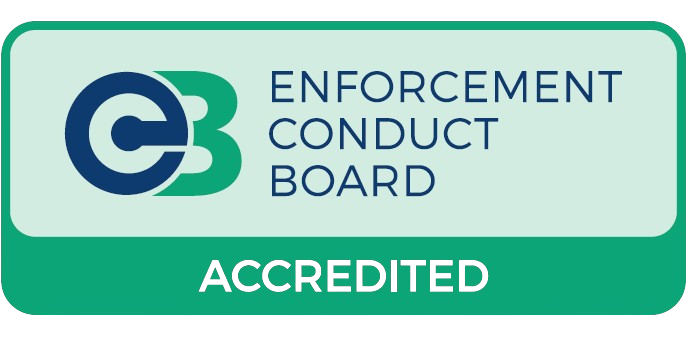Information for Police Officers When Dealing With Bailiffs (Enforcement Agents)
Need a copy for reference? Download the full PDF.
UK Bailiffs often work alongside Police forces. Here we explain some of the legislation relating to Enforcement Powers.

Paragraph 68(1), Schedule 12, Tribunals Courts and Enforcement Act 2007
CJS Code: TC07001
A person is guilty of an offence if they intentionally obstruct a person lawfully acting as an enforcement agent.
Full LegislationSummary offence only
Up to 51 weeks imprisonment
Fine up to £5,000
Or both
Paragraph 68(2), Schedule 12, Tribunals Courts and Enforcement Act 2007
CJS Code: TC07001
A person is guilty of an offence if they intentionally interfere with controlled goods without lawful excuse.
Full LegislationSummary offence only
Up to 51 weeks imprisonment
Fine up to £5,000
Or both
A bailiff may not be arrested for a breach of the peace during the execution of lawful duties.
- Mr. Bibby entered a debtor's shop to enforce a liability order.
- The debtor became uncooperative; both parties called the police.
- Police arrested Mr. Bibby despite his lawful authority.
- Was the arrest lawful despite Bibby acting under lawful authority?
- Did the police misuse their powers to prevent breach of the peace?
- Appeal allowed — Bibby's arrest was unlawful.
- Police should have dealt with the debtor, not the bailiff.
- Use of handcuffs deemed unreasonable.
The Court of Appeal held that Mr. Bibby’s arrest was unjustified. Arrests for breach of the peace must target the person causing or provoking the threat. In this case, that person was the debtor.
This case sets a precedent on police powers and enforcement agent protections during lawful duties. It underscores the importance of identifying the true source of threat when enforcing public order.
- Can only be used by the landowner
- Used to regain possession of land
- Do not require court involvement
- Enforced by landowner and/or private bailiffs
- No criminal sanction for return of trespassers
- Can only be used by the landowner
- Used to regain possession of land
- Requires civil court procedure
- Enforced by county court bailiffs
- No criminal sanction for return of trespassers
- Used by local authorities only
- Applies to any land within the local authority's area
- Used to remove identified individuals
- Court needed only if people refuse to leave
- Enforced by local authority or employed bailiffs
- Return within 3 months carries criminal sanctions
- Used by police only
- Applies to all land except highways
- Removes individuals and/or vehicles
- Must be two or more trespassers
- No court involvement
- Enforced by police
- Return within 3 months carries criminal sanctions
- Used by police when an alternative site is available
- Applies to any land
- Removes individuals and/or vehicles
- No court involvement required
- Return within 3 months carries criminal sanctions
- Landowners can use common law to evict trespassers and seek damages or injunctions.
- Trespassers entering peacefully must be asked to leave before reasonable force is used.
- If refused, only proportionate force may be applied.
- Evictions can be carried out by private bailiffs (Enforcement Agents).
- "Reasonable force" depends on the situation — excessive force may bring legal risk.
- Police should be informed and consulted in advance.
- Police attendance recommended to ensure peace is maintained.
This process underscores that even though excluded occupiers do not have the same protections as tenants, the law still requires that evictions be conducted within the framework of legality, respecting personal rights and avoiding the use of force.
What you can do when a bailiff visits: A bailiff (enforcement agent) may visit your home if you do not pay your debts - such as Council Tax bills, parking fines, court fines and county court, high court or family court judgments. This will happen if you ignore letters saying that bailiffs will be used.
Types of bailiffs: ‘Certificated enforcement agents’ (civil enforcement agents), ‘High Court enforcement officers’, county court and family court bailiffs, and bailiffs for magistrates’ court fines and arrest warrants (civilian enforcement officers or Approved Enforcement Agents).
A bailiff may also serve documents or issue summons. Approved Enforcement Agents can arrest you under a warrant for breaking a community penalty order.
You will usually get at least 7 days’ notice before their first visit, but this isn’t always required.
Paying before a visit: You can stop a visit by paying your debt in full. Contact your creditor for payment advice. Non-payment of criminal debts like fines or penalty notices may result in arrest.
Dealing with bailiffs: You don’t have to let them in. Bailiffs can’t usually enter by force, if only minors or vulnerable individuals are present, outside 6am–9pm hours, or through anything other than a door.
They can force entry to recover unpaid criminal fines, Income Tax, or Stamp Duty—but only as a last resort.
If refused entry, they might take items from outside (e.g., your car), and your debt may increase. If allowed in and unpaid, they can seize goods to cover the debt and their fees.
Vulnerable individuals (e.g., with mental health issues) may be granted more time or support.
Checking identity: Ask for a badge, ID card, or certificate. All bailiffs must have certification unless exempt. Impersonation is fraud. Check their identity via the certificated register or appropriate court.
Paying a bailiff: You can pay on the doorstep—no entry required. Always request a receipt. You may propose a payment plan, but acceptance is at the bailiff’s discretion.
What they can and cannot take: Bailiffs may take luxury items but not essentials (e.g., clothes, fridge, work tools under £1,350, or others’ property). Proof of ownership is required to protect others’ belongings.
Complaints: Complain if the bailiff harasses, breaks entry rules, overcharges, or seizes others’ goods. Complaints can be made to their employer or the creditor.
Complaining to court: If certificated, use Form EAC2 to ask a court to review their conduct. Complaints are free, but legal costs may apply if there are no reasonable grounds.



